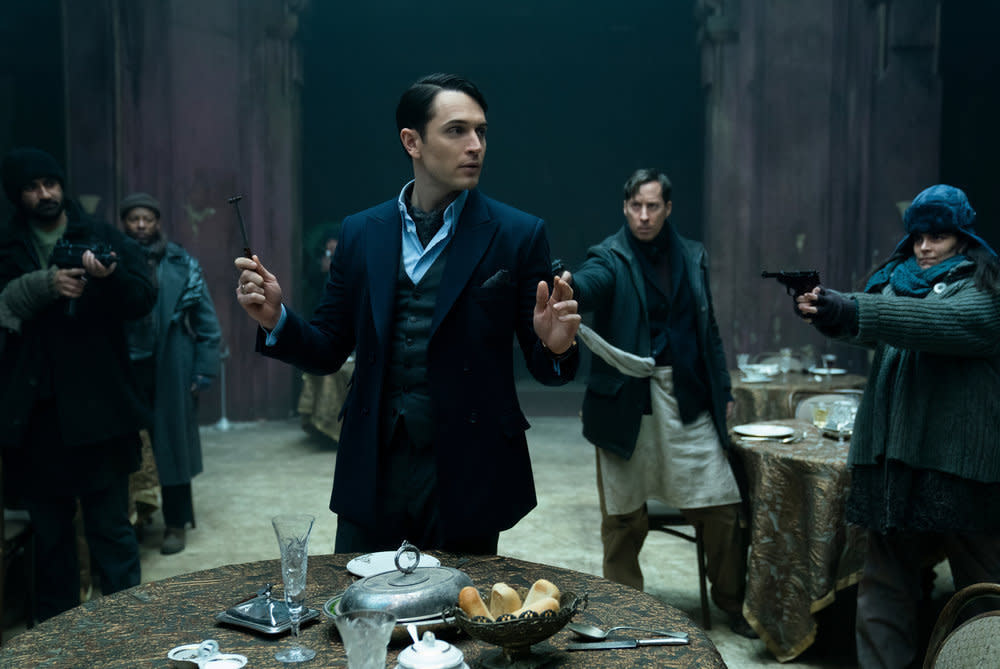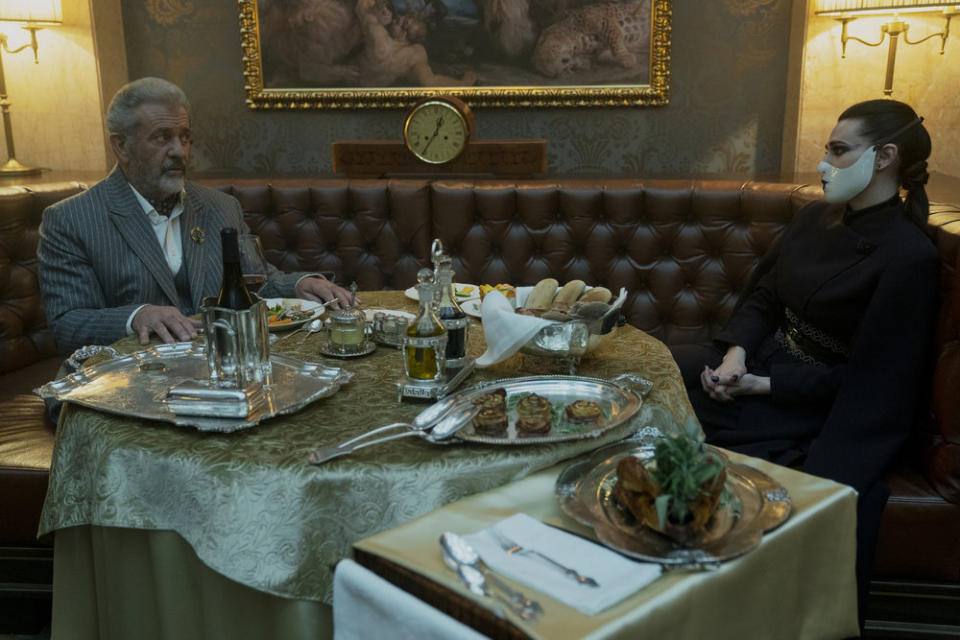‘The Continental’ Review: John Wick Prequel Series Is Another Hollow Imitation

After four movies and just over $1 billion at the box office, it’s easy to forget that “John Wick” wasn’t supposed to be a franchise. The first film was sold as a revenge fantasy for “Marley & Me” fans who weren’t satisfied with a good cry. Its budget was modest, accommodating a star the industry considered declining and co-directors with more experience behind a wheel than a camera. Even the theatrical revenue, rather than totaling the kind of tallies that spin studio heads’… heads, were only viewed as above-average. Yet each subsequent sequel saw the gun-toting widower’s popularity skyrocket. As more and more bodies hit the floor, more and more dollars filled Lionsgate’s coffers. John Wick’s journey from obscurity to omnipresence was so unexpected, the third film functioned as a particularly morbid metaphor for coping with newfound fame.
Wick became a franchise because of two essential factors — and in spite of a third. The assets are so obvious they almost needn’t be mentioned: Keanu Reeves may have released a few duds before donning Baba Yaga’s bulletproof suit (“The Day the Earth Stood Still” chief among them), but he is an irrepressible star with immaculate physical prowess. His involvement was (and is) critical, especially given the exacting, entrancing stunt work demanded by former stuntman (and Reeves’ former body double) Chad Stahelski, whose approach to directing action scenes is the series’ second key to success (alongside uncredited co-director David Leitch). But what each sequel had to overcome was its makeshift cinematic universe. What was cool and mysterious in the first movie — an underground world of assassins with their own currency and regulations — often felt cumbersome and questionable as they were further explained and embodied across each epic quest. Sometimes, what lives in our imagination is better than seeing it limited by reality.
More from IndieWire
Enter “The Continental,” a three-episode prequel series (sporting the unwieldy yet universe-signifying subtitle “From the World of John Wick”) about the history of the hotel for assassins. Stahelski and Leitch are on board, though only as executive producers, while Reeves couldn’t even be cajoled into an honorary title, let alone pop up for a flash-forward cameo of some kind. No, “The Continental” is decidedly not a “John Wick” movie, but a less-focused, oddly structured TV show that functions like a very long pilot and an utterly unnecessary origin story. (Does anyone care that much about Winston? I mean, Ian McShane, absolutely, but Winston Scott the Hotelier? I think not, and “The Continental” offers little reason to start.) The first feature-length episode offers a few tantalizing flourishes (and, frankly, any project that sees fit to cast Ray McKinnon as a wine-swigging sharp-shooter can’t be all bad), but “The Continental” soon crumbles under its impossible burdens. The action is plentiful, yet can’t compare, the storytelling is careless, beyond repair, and the realization of vaunted myths, well, buyer beware.
At its heart, “The Continental” tells the tale of two brothers. Winston (Colin Woodell) and Frankie (Ben Robson) grew up on the mean streets of New York City, looking out for each other because no one else would. But after being scarred by childhood tragedy, they’ve become estranged as adults. Winston is selling parking garages in London, conning his way into massive sums of money, but things aren’t so easy for Frankie. He spent time in the Vietnam War before returning to the States and getting thrown in jail. Once out, the only gig he could get was working for the man who ruined he and Winston’s lives: Cormac O’Connor (Mel Gibson), a minor criminal kingpin and the Continental’s manager.
Cormac, who loves bad puns almost as much as he loves huffing “medicine” from a towel, has an Irish name, an Aussie’s wild eyes, and an intermittent Brooklyn accent. He screams and howls. He threatens and swears. He bursts into fits of rage, often for little reason at all. He’s a prototypical villain — with that extra demented dimension only Gibson can bring — but watching Cormac is almost exactly like watching the worst version of a real-life Mel Gibson; the version you’ve read about online and heard told across Hollywood. It’s deeply unsettling, which works for the character (he’s certainly meant to be deeply unsettling) but also works against the show. (I do not believe the creators wanted us imagining Mel Gibson beating the shit out of defenseless people.)

Anyway, when Freddie steals a prized coin press (used to make the High Table’s golden currency), Mel– I mean, Cormac forcibly escorts Winston back across the pond to serve as bait for his big brother. The siblings must mend their relationship, mount a resistance, and survive an onslaught of attackers if they want to avoid further scarring at the hands of their lifelong oppressor.
“The Continental” head-fakes at themes echoed across “John Wick” — vengeance, regret, and the finality of major life decisions (as embodied by lethal acts of violence). But it doesn’t stand by them. “You know,” Freddie says to Winston near the end of “Night One.” “Sometimes you’ve got to make choices you don’t want [to make] to protect the people you care about. Maybe you’ll get to understand that one day.” Despite the weight of Freddie’s words — delivered with the gravitas often given to a narrative’s thesis statement — Winston’s choices in “The Continental” are all ones he wants to make. He even loops in innocent people to help with his chosen cause, despite knowing they could, and likely will, end up dead. His narrative arc isn’t curved; it’s not a bullet from “Wanted,” but a blunt shot straight to the temple. And his cohorts don’t fare much better.
Given its brevity as a television season (three episodes, instead of six, eight, or more) as well as it’s lengthy development, I’m tempted to see “The Continental” as an outrageously long pilot. But that may be a generous reading for a show where so many characters are introduced, yet so few of them are explored. Where the “John Wick” movies cherished introducing new guests — like Donnie Yen’s MVP, Caine, in No. 4 or No. 2’s fan-favorite Bowery King, played by Laurence Fishburne — the series doesn’t extend much thought beyond an ill-fitting wig.
Among the supporting regulars, there’s Yen (Nhung Kate), Freddie’s Vietnamese wife (and, of course, a killer in her own right), who’s the (stereotypical) silent type, even when multiple characters have a firm grasp on her native language. Little is known about her backstory before Freddie or her greater ambitions beyond him, which goes double for the mute twin assassins played by Mark Mushashi and Marina Mazepa. At one point, Not Mel Gibson refers to the duo as “the twins — Hansel, Gretel, whatever the fuck they’re called” — so I assumed those weren’t their actual names. Now, looking over the press notes, I regret to report I was wrong.
Miles (Hubert Point-Du Jour) and Lou (Jessica Allain) have the unfortunate task of defending their family dojo in a post-“Barbie” landscape. (Also worth noting: Gibson’s lair is decorated with so many horses.) Mishel Prada (please watch “Vida”) is saddled with an even thicker accent than Gibson, plus playing the first female detective in the precinct… who’s also sleeping with her boss. Katie McGrath struts around as an Adjudicator from The High Table who doesn’t do much behind wearing a mask over her mouth, which hides some ghastly deformity that’s ghoulishly teased throughout the show. Finally, there’s Charon, a role originated by the late, great Lance Reddick in the films who’s given a slapdash backstory of his own here, played by Ayomide Adegun. I can’t say these travails deepen our relationship with the character, but hey, it’s nice to see how our favorite concierge met Winston.
For those of you clawing your hair out, screaming at the computer screen, “No one cares about any of this! Are the people killed real good or not?”, let me just say: Meh. Since the first film sparked action junkies’ interest, Hollywood has tried to copy “John Wick’s” artful extended takes and operatic brutality, be it by employing Leitch for fight features like “Atomic Blonde” and “Bullet Train,” or leaning on his production company for similarly minded beat-em-ups like “Nobody” and “Kate,” or merely taking inspiration from the 87Eleven action team in movies like “Extraction” and “Extraction 2.” The best imitations apply a similar formula to an intriguing star (with Charlize Theron and Bob Odenkirk pushing their aggrieved, overworked assassins to brutishly satisfying ends), while the worst drown a slow death from VFX and lazy quips.
“The Continental” is more the latter than the former. Initial scenes play with flashy colors and distinctive designs in a similar fashion to the films. (Where the movies preferred sharp, clean aesthetics, the show paints Manhattan amid a garbage strike — trash lines the streets, and every exposed wall is blanketed with graffiti.) Albert Hughes, who directs the first and third episodes, sets up a handful of clever extended takes that blend practical effects with frame-deepening CGI. The initial heist is fun, and the closing shootout clicks. But most of “The Continental” gets washed out by too many shadows and too little thought. As the action scenes pile on top of each other, they become less distinguished, more generic, and inevitably unexciting. The lack of clear visuals proves doubly frustrating since part of what made “John Wick” so compelling was its commitment to clarity. Audiences want to see what’s going on, not guess what happened when the lights were out.
So many sloppy splits from what made the films special dooms “The Continental.” It stumbles toward an inept, non-ending, where there’s plenty of story still to tell if a successful run demands more seasons, yet not enough resolution to make what you just saw feel meaningful. While anything could once again happen, a Wick-less John Wick may just be too crazy to work.
Grade: C-
“The Continental: From the World of John Wick” premieres September 22 on Peacock. The three-episode limited series will be released weekly.
Best of IndieWire
Sign up for Indiewire's Newsletter. For the latest news, follow us on Facebook, Twitter, and Instagram.
